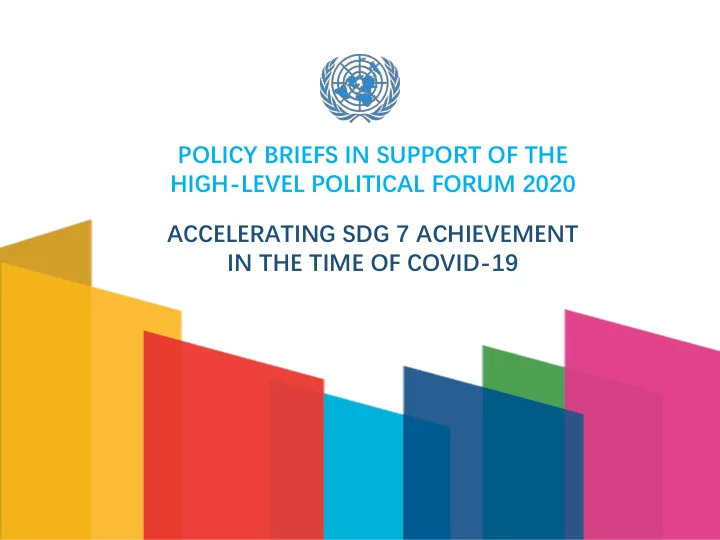

POLICY BRIEFS IN SUPPORT OF THE HIGH-LEVEL POLITICAL FORUM 2020 ACCELERATING SDG 7 ACHIEVEMENT IN THE TIME OF COVID-19
SDG 7 POLICY BRIEFS IN SUPPORT OF HIGH-LEVEL POLITICAL FORUM 2018 2018 First Global Review of SDG7 on ENERGY Transformation towards sustainable and resilient societies 2019 2019 HLPF under the auspices of the ECOSOC - July SDG Summit - September 2020 2020 Accelerated action and transformative pathways: realizing the decade of action and delivery for sustainable development
SDG 7 POLICY BRIEFS 2020’s FOCUS Regional perspective Advancing SDG 7 in the face of COVID-19: • Asia and the Pacific implications and way forward • Arab Region • UNECE Region • Latin America and the Caribbean • Least Developed Countries UNLDC-V in 2021 Regional Perspective Advancing SDG 7 Implementation in support of the 2030 Agenda Toward a sustainable and COVID-19 equitable energy future Energy • Multi-Tier Framework Future • Energy scenarios guiding the Implementation energy transition • energy access in displacement settings • Global Energy Interconnection NDCs Interlinkages Strengthening interlinkages Advancing SDG 7 through NDCs NDC Enhancement contributing to the HLPF 2020 thematic topics • Advancing human well-being • Ending hunger and achieving food security for all • Protecting the planet and building resilience • Sharing economic benefits • Bolstering local action to accelerate implementation
OVERARCHING MESSAGES ➢ We must maintain global momentum to accelerate a shift towards decarbonised, climate resilient energy systems and universal energy access. ➢ Although the world continues to advance toward SDG 7, overall efforts are falling well short of the scale required to reach the SDG 7 targets by 2030. ➢ Far more needs to be done to achieve net-zero emissions by 2050 in pursuit of the 1.5°C goal. ➢ Post COVID-19 recovery strategies present opportunities for economies to become greener and more resilient – based on the SDG 7 targets. ➢ We call on all Member States and other stakeholders to drive the global energy transformation forward by forming transformational partnerships.
COVID-19: IMPLICATIONS FOR SDG 7 PROGRESS ➢ Energy services are essential for fighting the pandemic – including for powering healthcare facilities and keeping medicines cold, supplying clean water for people to wash their hands, and providing communications services to connect people, share information, and facilitate education during social distancing. ➢ Expanding these services through increased investments in sustainable energy solutions will aid countries in responding to the pandemic while also creating significant green jobs, empowering women, reducing greenhouse gas emissions and advancing other Sustainable Development Goals. ➢ The 2030 Agenda and the Paris Agreement should be used as a road map towards more resilient societies with stronger health systems, fewer people living in extreme poverty, more gender equality, and a healthier natural environment. ➢ The COVID-19 crisis will likely have serious effects on SDG 7 progress. • 2020 is set to see the largest decline in energy investment on record, a reduction of 20% – or almost US$ 400 billion – in capital spending compared with 2019. • The pandemic could either widen the existing sustainable energy access gaps or accelerate the path towards achieving SDG 7, depending on the priorities of national recovery efforts.
COVID-19: RECOMMENDED ACTION AND INTERLINKAGES TO SDGs Building back better to achieve SDGs and the Paris Agreement: Integrated sustainable energy solutions package • Sustainable energy solutions integrated into COVID-19 responses and recovery strategies • Enhanced NDCs as a framework for green investment • Better health services through economic recovery packages • Green jobs and growth • Modern energy services that save lives • Empowered women • Renewables and energy efficiency to create green jobs • Clean air and reduced pollution • Phase out inefficient fossil fuel subsidies • Net zero emissions pathways • Just transition strategies to support the phase-out of coal • Resilient communities • Support vulnerable groups to leave no one behind • Partnerships • A more gender-equal response and recovery • Strengthen international cooperation • A transition from energy intensive lifestyles to more sustainable patterns • Development activities to prioritise green investment • Strengthen international cooperation and multilateralism
Convened by
Recommend
More recommend